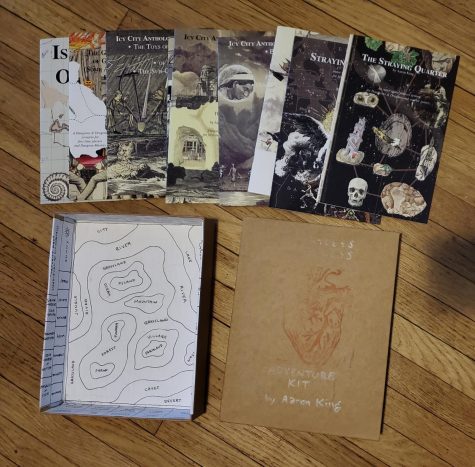Zines, defined as self-published works of art and writing, became popular in the early 1990s during what is known as the riot grrrl movement, a feminist movement that emerged from the punk music scene of Olympia, Washington.
Subjects of zines range from educational and informative to poetry or fiction or solely visual art. The Minneapolis zine community continues to create and distribute zines inspired in part by the riot grrrl movement’s ideals, with special emphasis on intersectionality and inclusivity.
For example, instead of riot grrrl, some people have called for “riot ghouls” to emphasize the need for more inclusivity of nonbinary folx, Kate Kanfield, bassist of Minneapolis punk band VIAL, said.
K.T. Taylor, a Minneapolis digital artist, said zines remind people that anyone can make art with the resources they already have, and formal or special training isn’t necessary to make them.

Taylor created a zine project in 2020 titled “Not Alone, Never Was: A Penpal Zine 4 Rural Queers” that allowed queer people living in rural areas to connect in isolation.
Taylor said they drew inspiration for the project from rural queer communities in the 1960s and 1970s that also connected through similar zines and letter-writing projects.
Gabby Coll, co-founder of the Burn Something Collective, a collective committed to the curation, publication and mentorship of Black, Indigenous and people of color femme, nonbinary and trans artists, said accessibility is a big part of the zine community.
“Historically speaking, the art world has not been accessible to many folx unless you are cis, white and educated through specific institutions,” Coll said.
Burn Something Collective hopes to provide access to art and zine resources previously not available to trans folx and folx of color.
“There are some really powerful artists making important work in this format,” Coll said.
Self-taught graphic designer and University of Minnesota graduate allison anne said they remember being exposed to zines in the late 90s and early 2000s after gaining internet access.
“I was just fascinated by all of it,” anne said.
In their mid-20s, anne started making zines, and they started making them regularly in the past year during quarantine. They said making zines helped them overcome imposter syndrome as an artist because zines aren’t meant to be perfect and instead are meant to create community.
“It’s an opportunity to share experiences, knowledge, different kinds of observations,” they said.
Aaron King, a Minneapolis zinester and previous co-organizer of Twin Cities Zine Fest, said zines are important because of the “low barrier to entry.”
“Some voices and ideas might not be accepted by larger publishing houses but still want to do that work and form a community,” King said.
Zine libraries continue to preserve zines. Such libraries include Hennepin County Library, the Minneapolis Community and Technical College library, the University of Minnesota library and the recently established Aapli Library in northeast Minneapolis.
